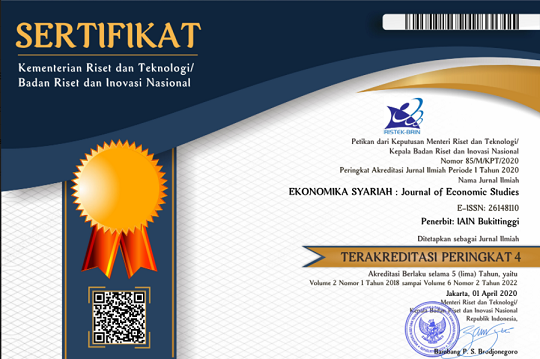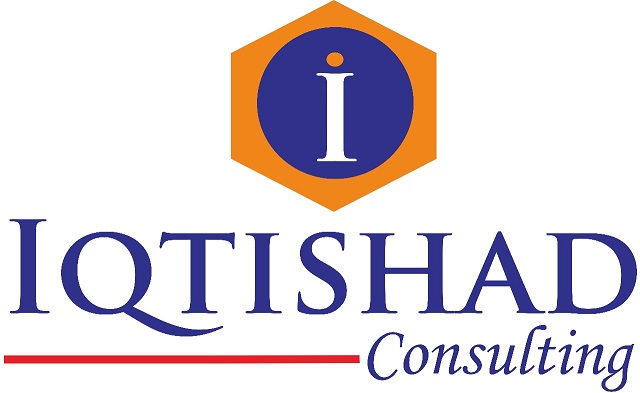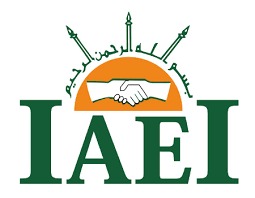Determinants of Contemporary Sharia Financial Literacy among Students in Higher Education Institutions
DOI:
https://doi.org/10.30983/es.v9i1.9265Keywords:
Financial Literacy, Sharia Finance Literacy, StudentsAbstract
This research aims to analyze the determinants of contemporary Sharia financial literacy among students of the Faculty of Economics and Business at Universitas Riau (FEB UNRI). This study employs a quantitative approach, using numerical data derived from both primary and secondary sources. Primary data were collected through questionnaires using a Likert scale, distributed to 304 students from the Development Economics, Accounting, and Management study programs. Secondary data were obtained from literature reviews, academic journals, websites, and publications from financial and statistical institutions. The data analysis method used was Multiple Linear Regression with the SEM-PLS (Structural Equation Modeling–Partial Least Squares) approach. The results indicate that education, information media, and the role of clerics/government have a significant and positive effect on Sharia financial literacy,while the social environment has a positive but insignificant effect. The primary contribution of this study is to emphasize the importance of enhancing Sharia financial literacy among students as part of preparing the younger generation to support the development of a more advanced Islamic economic system in the future.
Studi ini bertujuan untuk menguji determinan literasi keuangan syariah kontemporer mahasiswa Fakultas Ekonomi dan Bisnis Universitas Riau (FEB UNRI). Studi dilakukan dengan metode kuantitatif dengan data berbentuk numerikal. Studi menggunakan data kuantitatif berupa data primer dan data sekunder. Data primer menggunakan hasil wawancara dan kuesioner dengan skala likert pada mahasiswa FEB UNRI yang berjumlah 304 orang yang berasal dari Program Studi Ekonomi Pembangunan, Akuntansi dan Manajemen. Sedangkan data sekunder berupa data yang tersedia dari studi literatur, jurnal, website, terutama dari lembaga keuangan dan statistik. Metode analisis data adalah regresi linier berganda menggunakan model SEM-PLS. Temuan mengungkap bahwa Pendidikan, media infromasi, dan peran ulama/pemerintah berpengaruh signifikan dan positif, dan terakhir lingkungan sosial berpengaruh tidak signifikan dan positif, terhadap literasi keuangan syariah pada mahasiswa FEB UNRI. Kontribusi utama dalam studi adalah untuk meningkatkan khazanah ekonomi dan keuangan syariah saat ini kepada mahasiswa sebagai generasi muda untuk masa depan dan untuk mengembangkan ekonomi yang lebih maju.
References
Amagir, A., Groot, W., Maassen van den Brink, H., & Wilschut, A. (2018). A review of financial-literacy education programs for children and adolescents. Citizenship, Social and Economics Education, 17(1), 56–80. https://doi.org/10.1177/2047173417719555
Arceo-Gómez, E. O., & Villagómez, F. A. (2017). Financial literacy among Mexican high school teenagers. International Review of Economics Education, 24, 1–17. https://doi.org/10.1016/j.iree.2016.10.001
Aren, S., & Nayman Hamamcı, H. (2022). The impact of financial defence mechanisms and phantasy on risky investment intention. Kybernetes, 51(1), 141–164. https://doi.org/10.1108/K-10-2020-0695
Dafiq, B. I., Hidayati, A. N., & Habib, M. A. F. (2022). Pengaruh literasi keuangan, literasi digital, digital marketing, brand image dan word of mouth terhadap minat generasi z pada bank syariah. Fair Value: Jurnal Ilmiah Akuntansi Dan Keuangan, 4(11), 4971–4982. https://doi.org/10.32670/fairvalue.v4i11.1856
Fa`iq Khotibul Umam, Nuris Dwi Setiawan, Danang Danang, & Mufadhol Mufadhol. (2024). Perancangan Tempat Sampah Pintar Berbasis Arduino Uno. Jurnal Sistem Informasi Dan Ilmu Komputer, 2(1), 225–236. https://doi.org/10.59581/jusiik-widyakarya.v2i1.2728
Fatmah Rahmawati, O., & Laily Nisa, F. (2024). Penerapan Akad Istishna dalam Sistem Cash On Delivery (COD) pada Transaksi Jual Beli Online. JURNAL EKONOMI BISNIS DAN MANAJEMEN, 2(3), 178–188. https://doi.org/10.59024/jise.v2i3.813
Hamzah, A. (2021). Pemikiran Ekonomi Islam Kontemporer: Kajian Teoritis Muhammad Abdul Mannan Tentang Distribusi. Al-Qisthu: Jurnal Kajian Ilmu-Ilmu Hukum, 18(1). https://doi.org/10.32694/qst.v18i1.801
Hidayat, F. P., & Ginting, R. (2020). Media Literacy of Communication Students in Using Facebook. ETTISAL : Journal of Communication, 5(1). https://doi.org/10.21111/ejoc.v5i1.3947
Hulland, J. (1999). Use of partial least squares (PLS) in strategic management research: a review of four recent studies. Strategic Management Journal, 20(2), 195–204. https://doi.org/10.1002/(SICI)1097-0266(199902)20:2<195::AID-SMJ13>3.0.CO;2-7
Iswandi, A. (2023). Efektivitas Intervensi Pendidikan untuk Meningkatkan Literasi Keuangan Islam pada Mahasiswa: Studi Kasus di Universitas PTIQ Jakarta. Al-Tasyree: Jurnal Bisnis, Keuangan Dan Ekonomi Syariah, 15(01), 10–17. https://doi.org/10.59833/altasyree.v15i01.1154
Irfayunita, F., & Puteri, H. E. (2019). Pengaruh Financial literacy Terhadap Preferensi Masyarakat Kabupaten Tanah Datar Memilih Produk-Produk Pendanaan Pada Perbankan Syariah. EKONOMIKA SYARIAH : Journal of Economic Studies, 3(1), 20. https://doi.org/10.30983/es.v3i1.973
KNKS. (2019). Laporan Perkembangan Keuangan Syariah.
Lindiawatie, L., Ria, A., Estiningsih, W., & Shahreza, D. (2024). Pengelolaan Keuangan Rumah Tangga Berbasis Syariah. Jurnal Pengabdian Kepada Masyarakat Bangun Cipta, Rasa, & Karsa, 3(4), 105–111. https://doi.org/10.30998/pkmbatasa.v3i4.3250
Lusardi, A. (2019). Financial literacy and the need for financial education: evidence and implications. Swiss Journal of Economics and Statistics, 155(1), 1. https://doi.org/10.1186/s41937-019-0027-5
Maharani, J., & Putra, Y. H. S. (2023). Pengelolaan Keuangan Keluarga Perspektif Islamic Wealth Management. PROFIT: Jurnal Kajian Ekonomi Dan Perbankan Syariah, 7(1). https://doi.org/10.33650/profit.v7i1.6434
Margaretha, F., & Pambudhi, R. A. (2015). Tingkat Literasi Keuangan Pada Mahasiswa S-1 Fakultas Ekonomi. Jurnal Manajemen Dan Kewirausahaan (Journal of Management and Entrepreneurship), 17(1). https://doi.org/10.9744/jmk.17.1.76-85
McGregor, S. L. T., & Hamdan Alghamdi, A. K. (2024). Measuring Islamic Financial Literacy. Financial Planning Research Journal, 10(1). https://doi.org/10.2478/fprj-2024-0003
Muchamad Bagus Satrio Wibowo, & Muhammad Iqbal. (2022). Faktor Pengetahuan dan Religiusitas Generasi Z Terhadap Minat Menabung di Bank Syariah. MALIA (TERAKREDITASI), 13(1), 93–106. https://doi.org/10.35891/ml.v13i1.2795
Muharromah, S., Huda, N., Muslikh, M., & Rini, N. (2023a). Does The Community’s Perspective Encourage Customers To Take Financing Products At Sharia Bank? Jurnal Ekonomi Dan Bisnis Islam (Journal of Islamic Economics and Business), 9(2), 401–428. https://doi.org/10.20473/jebis.v9i2.47143
Muharromah, S., Huda, N., Muslikh, M., & Rini, N. (2023b). Does The Community’s Perspective Encourage Customers To Take Financing Products At Sharia Bank? Jurnal Ekonomi Dan Bisnis Islam (Journal of Islamic Economics and Business), 9(2), 401–428. https://doi.org/10.20473/jebis.v9i2.47143
Mukti, D. A., Thaib, Z. bin H., Fahrozi, Ardi, M. Z., & Ummah, M. F. I. (2024). Building a Sakinah Family of Qur’anic Memorizers: A Strategic Approach and Dynamics in the Framework of Contemporary Islamic Family Law. Legitima : Jurnal Hukum Keluarga Islam, 7(1), 40–57. https://doi.org/10.33367/legitima.v7i1.5892
Mustofa, U. (2020). Efektivitas Program Edukasi dan Religiositas dalam Meningkatkan Literasi dan Inklusi Keuangan Syariah. Iqtisad: Reconstruction of Justice and Welfare for Indonesia, 7(2), 214–231. https://doi.org/10.31942/iq.v7i2.3710
Nasution, A. W., & Nasution, A. W. (2019). Analisis Faktor Kesadaran Literasi Keuangan Syariah Mahasiswa Keuangan Dan Perbakan Syariah. Equilibrium: Jurnal Ekonomi Syariah, 7(1), 40. https://doi.org/10.21043/equilibrium.v7i1.4258
Nur Masithoh, F. (2024). The Impact of Social Media Influencers On Personal Finance And Investment Decisions. Jurnal At-Tamwil: Kajian Ekonomi Syariah, 6(2), 196–214. https://doi.org/10.33367//at.v6i2.1498
OJK. (2024, October). Survei Nasional Literasi dan Inklusi Keuangan (SNLIK) 2024. Https://Ojk.Go.Id/Id/Berita-Dan-Kegiatan/Publikasi/Pages/Survei-Nasional-Literasi-Dan-Inklusi-Keuangan-(SNLIK)-2024.Aspx. https://ojk.go.id/id/berita-dan-kegiatan/publikasi/Pages/Survei-Nasional-Literasi-dan-Inklusi-Keuangan-(SNLIK)-2024.aspx
OJK. (2025, May). Survei Nasional Literasi Dan Inklusi Keuangan (SNLIK) Tahun 2025. https://ojk.go.id/id/berita-dan-kegiatan/siaran-pers/Pages/OJK-dan-BPS-Umumkan-Hasil-Survei-Nasional-Literasi-Dan-Inklusi-Keuangan-SNLIK-Tahun-2025.aspx. https://ojk.go.id/id/berita-dan-kegiatan/siaran-pers/Pages/OJK-dan-BPS-Umumkan-Hasil-Survei-Nasional-Literasi-Dan-Inklusi-Keuangan-SNLIK-Tahun-2025.aspx
Rabbani, A. A., Tubastuvi, N., Rahmawati, I. Y., & Widyaningtyas, D. (2024). Pengaruh Literasi Keuangan, Status Sosial Ekonomi, Lingkungan Sosial, Locus Of Control Dan Gaya Hidup Terhadap Pengelolaan Keuangan Mahasiswa. Jurnal Ilmiah Manajemen, Ekonomi, & Akuntansi (MEA), 8(1), 456–475. https://doi.org/10.31955/mea.v8i1.3701
Riaz, U., Burton, B., & Fearfull, A. (2023). Emotional propensities and the contemporary Islamic banking industry. Critical Perspectives on Accounting, 94, 102449. https://doi.org/10.1016/j.cpa.2022.102449
Wibisono, A., Anwar, M., & Kirono, I. (2015). Stuctural Equation Modeling Partial Least Square (Sem Pls) Untuk Mengetahui Kinerja Karyawan Pada Pt. Dempo Laser Metalindo Surabaya. J Statistika: Jurnal Ilmiah Teori Dan Aplikasi Statistika, 7(1). https://doi.org/10.36456/jstat.vol7.no1.a184
Zahra, Q. S. A., & Nurhasanah, E. (2023). Analisis Tingkat Literasi Keuangan Syariah UMKM di Tasikmalaya. EKSISBANK: Ekonomi Syariah Dan Bisnis Perbankan, 7(1), 186–195. https://doi.org/10.37726/ee.v7i1.816
Downloads
Published
How to Cite
Issue
Section
Citation Check
License
Copyright (c) 2025 M Rizwan, Eriyati, Yelly Zamaya

This work is licensed under a Creative Commons Attribution-ShareAlike 4.0 International License.
Authors who publish with this journal agree to the following terms:
- Authors retain copyright and grant the journal right of first publication with the work simultaneously licensed under a Creative Commons Attribution-ShareAlike 4.0 International License that allows others to share the work with an acknowledgment of the work's authorship and initial publication in this journal.
- Authors are able to enter into separate, additional contractual arrangements for the non-exclusive distribution of the journal's published version of the work (e.g., post it to an institutional repository or publish it in a book), with an acknowledgment of its initial publication in this journal.
- Authors are permitted and encouraged to post their work online (e.g., in institutional repositories or on their website) prior to and during the submission process, as it can lead to productive exchanges, as well as earlier and greater citation of published work (See The Effect of Open Access).




